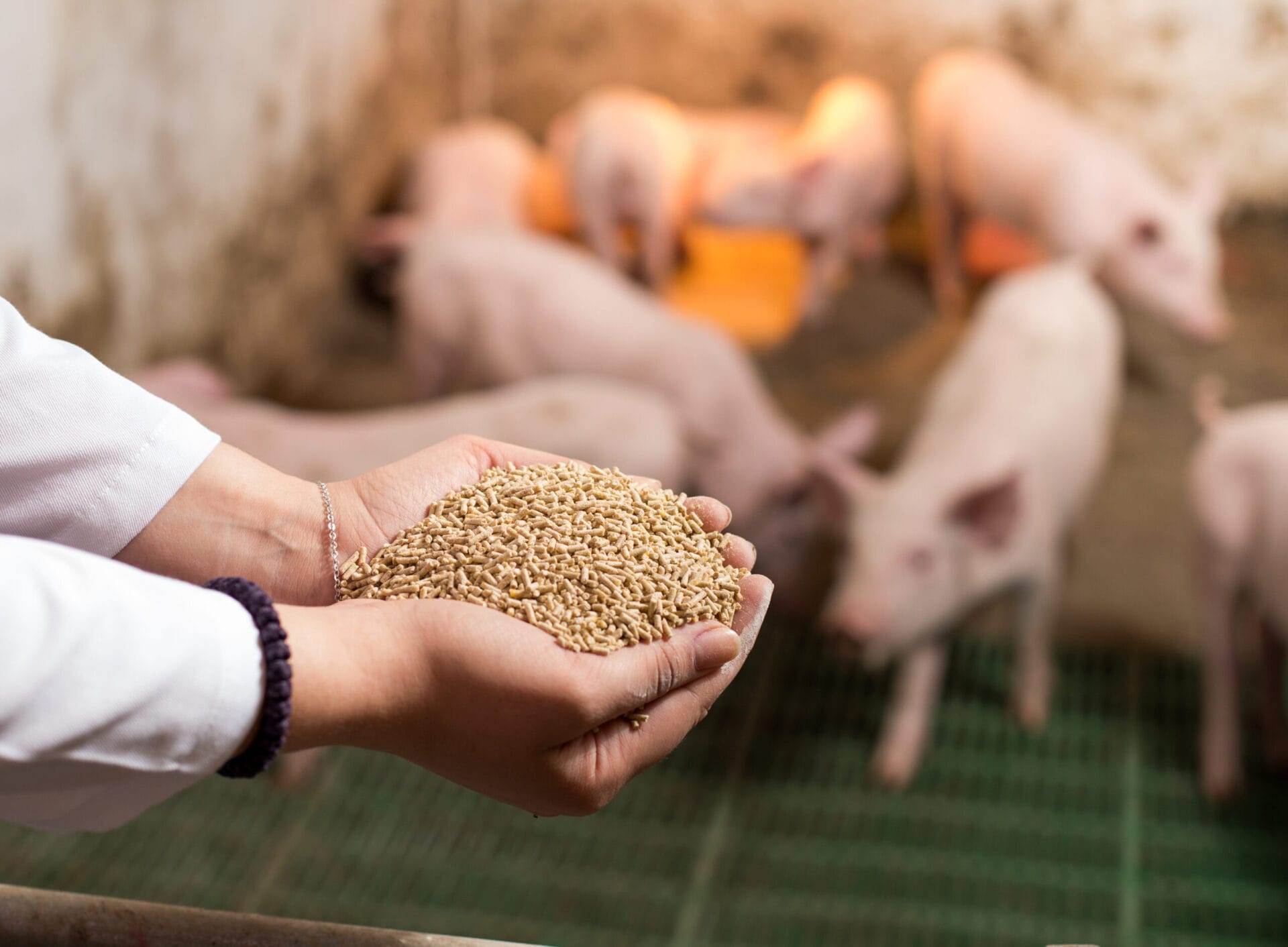Genomic conversations: genetically editing animals for agriculture

How do you feel about the genetic editing of farm animals, such as chickens, sheep, pigs and cows? In this conversation page, we’ll explore the role of genetic editing in agriculture – and some of the benefits, risks and what the future may hold.
Key terms
Genetic engineering
The direct manipulation of genes to alter an organism’s characteristic in a particular way.
Genetic modification
The process of altering the genetic material of an organism, including direct and indirect methods.
Transgenic
An organism that contains additional, artificially-introduced genetic material originating from a different organism in every cell.
CRISPR-Cas9
A type of genome editing technology that enables researchers to edit parts of the genome.
Genetically editing animals for agriculture
Humans have lived alongside animals for many thousands of years. Together, we’ve undergone several agricultural revolutions – initially transitioning from hunting and gathering to settled farming, and later harnessing innovations in breeding to produce animals with desired characteristics and improve productivity.
Today, we have new ways to change an organism’s characteristics. Guided by a deep understanding of genetics, we can move beyond traditional breeding techniques to directly modify an animal’s genome. You can read about some of the different tools used to edit genomes here.
As of 2023, two genetically edited animals have been approved for human consumption in the US, provided they are grown under tightly controlled conditions. Other applications being researched include animals that are more resistant to infections and disease, more nutritious or better adapted to different environmental conditions.
But there are many considerations surrounding genomic editing in animals. This includes important questions about welfare and a need to understand any long-term risks.

As of 2023, two genetically edited animals have been approved for human consumption in the US: the fast-growing AquAdvantage salmon and the GalSafe pig, which can be eaten by people who are allergic to a molecule called alpha-gal found in unmodified pigs.
Different people, different opinions
Over the next few sections, you’ll hear from Lucas, Sophie and Chris – three people who work in different departments on the Wellcome Genome Campus. They’ll share their thoughts and feelings about using genetic engineering in animals for agriculture.

"I don’t agree with genetic modification in agriculture. I believe we shouldn't play with genetics."
Lucas, Project leader

"The use of gene-editing techniques is a very complex topic which has both advantages and disadvantages. I think the ethics of these techniques very much depend on the context in which they are being used."
Sophie, PhD student

"On the whole, I think genetic modification is a positive thing. It’s just an evolution of the selective breeding practices that have always been used in agriculture."
Chris, Bioinformatician
Genetic selection is an inherent part of modern agriculture: farmers have long used selective breeding to produce livestock with desirable traits, such as nutrition and resistance to diseases.
Genetic editing techniques can now provide accelerated, targeted alternatives to selective breeding, to produce animals with specific traits. This includes traits that are difficult to achieve through conventional approaches. For example, selective breeding for increased milk and meat productivity has previously led to negative health outcomes for the animal, including skeletal abnormalities and increased risk of infections.
These advanced techniques can enable very precise edits to the genome. For instance, some people are allergic to the alpha-gal molecule, which is found in meat from pigs. The GalSafe pig has a precise edit to its alpha-gal gene, so that less of the molecule is produced – meaning people with the allergy can eat GalSafe meat without experiencing an allergic reaction.
The food and farming system faces many challenges associated with climate change and worldwide demand for food. Scientists are currently investigating different applications of gene-editing in farm animals that could help to overcome some of these challenges. These include:
- Disease resistance: for example, cattle that are less likely to develop infections of the mammary gland (mastitis) and pigs that are resistant to swine flu – both significant economic challenges in animal agriculture.
- Animal health: for example, chickens that are less vulnerable to skin conditions such as contact dermatitis.
- Production: for example, cattle with increased lean muscle or that produce greater quantities of milk. Innovations like this could help to address global food shortages.
- Environmental impact: for example, pigs that produce less phosphorus in their waste, which is a cause of environmental pollution on pig farms.
- Climate adaptation: for example, cattle with lighter coats so they can thrive in hotter conditions.
- Biofactories: for example, sheep and goats producing large quantities of medicinal products such as antibodies in their milk.
Different people, different views
“There are many possible applications of genetic editing in agriculture. If used correctly, it could improve animal welfare, reduce waste, and bring about desired change more efficiently.” - Chris
“Considering the climate issues at stake, I don’t think genetic editing is the right way to go if the expected benefits are only a matter of increasing production.” - Lucas
“I think genetic editing in agriculture can be justified if it has been thoroughly researched and proven to benefit the animal or improve the sustainability of farming, without compromising on welfare.” - Sophie
Are there potential benefits to genetically editing farm animals?
With genetic modification comes a risk of unpredicted, potentially harmful changes to the animal.
For example, early editing of pig genomes led to increased hormone production and faster growth, but caused the animals to be arthritic, partially blind and infertile. Advanced techniques like CRISPR-Cas9 can make precise genome edits, reducing the likelihood that other genes will be affected – but there is still a risk of unintentionally introducing changes that detrimentally affect the animal.
Many people also share the concern that gene editing could lead to the creation of animals that can tolerate poor husbandry and care, rather than improving conditions and practices.
All genetically modified organisms must be rigorously tested before they are approved for human use. This so that we can understand any risks to health – such as new or increased allergic reactions or possible toxic effects that arise with the editing of the genome.
The long-term risks associated with the release of genetically modified animals into the wild are not fully understood. For example, would they have a competitive advantage over native species? The modified animals that have been approved for use are tightly controlled to manage this risk. For example, the AquAdvantage salmon is only bred in a contained, land-based system.
There are also limitations of the technology, as many characteristics are controlled by the many genes. For example, cattle produce nearly 40% of all agricultural greenhouse gases and could be a good target for genetic editing, to help decrease agricultural emissions. However, many genes – including those of bacteria in the gut – control greenhouse gas emissions from cattle. It’s not yet been possible to target this with genome editing.
Different people, different views
“We shouldn’t justify genetic modification if it causes the animal to be unhealthy or uncomfortable, especially if it’s only done to improve meat quality or taste.” - Sophie
“To me, the risk is not worth the potential gain – there are so many unknowns. Mostly, GM is used to increase productivity and profit for industries, who don’t seem to care about the people, the environment or the climate.” - Lucas
“We also need to consider the disparity it could lead to in farming between those who can afford to adopt such practices, and those who cannot.” - Chris
Are there potential risks or limitations to genetically editing farm animals?
To understand the regulations around genetic editing, we need to understand the different ways to modify a genome.
Genetic editing involves making targeted changes to an organism’s genetic code. For example, the GalSafe pig, which had a change made to one existing gene. Meanwhile, transgenics is the movement of genes between species. The AquAdvantage salmon is transgenic, as it has had a typical Atlantic salmon gene replaced with genetic elements from the Pacific Chinook salmon and the ocean pout fish.
In agriculture, both techniques are regulated, but gene editing techniques are typically more permitted than transgenics. For example, in 2023, the UK Government introduced the Genetic Technology (Precision Breeding) Act. This allows the use of gene-editing techniques on agricultural plants and animals in England – provided no suffering is caused – if used to improve food security. Transgenic animals are not allowed in UK agriculture.
Different countries have different regulations surrounding genetically modified foods which can make it challenging to market and consume these products. For example, the AquAdvantage salmon can currently only be produced and eaten in the US and Canada. Some countries have banned genetically modified organisms altogether.
There are also differences about the requirement to label foods. In the US, as of 2022, all genetically edited foods must be labelled as ‘bioengineered’. Currently, there is no guidance in the UK about how genetically edited foods should be labelled, raising questions about consumer choice, should they become more commonplace on our plates in the future.
In terms of welfare, all animals in agriculture are subject to the same laws and acts, regardless of their level of genetic modification. The use of genetic editing in animals in research remains strictly controlled in many countries. You can read more about how animal welfare in research is controlled here.
Different people, different views
“I think genetic editing techniques will become widespread in agriculture. But I think we need careful regulation to maintain or improve animal welfare. We also need to avoid exploiting poorer farmers although this applies to all aspects of agriculture, not just GM.” - Chris
“I hope these rules and regulations prevent genome editing techniques from becoming widespread in agriculture.” - Lucas
What are the laws and regulations surrounding the genetic editing of farm animals?
Technologically, gene editing is limited only by our knowledge of genetics and the sophistication of our gene editing tools – and there’s no doubt this innovation will continue. When it comes to its use in agriculture, this could help to overcome some of the challenges associated with providing sustainable food for humans around the world.
Major ethical considerations remain, however – although many welfare concerns are applicable to both genetically modified and traditionally bred animals. Rigorous research is needed to ensure any new products are safe for consumption and have no risk of harming wildlife and the environment. And agricultural innovation can’t be the only solution to global food security – political and social solutions must also play a role.
It’s also likely that the use of genetically modified livestock in different countries will continue to be influenced by public attitudes.
Different people, different views
“Personally, I think everyone should become vegan and stop eating animal products altogether.” - Chris
“I think it will take a lot of time for these techniques to become widespread, and a big hurdle for this will be public perception. But I think they will gradually become more common, and this will likely grow the use of these techniques exponentially as they become mainstream in society.” - Sophie